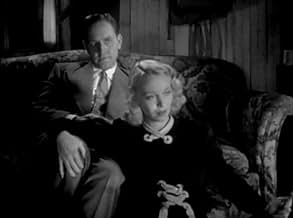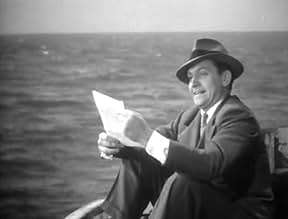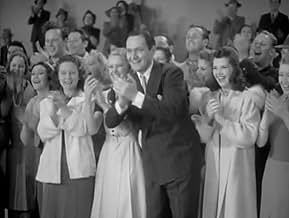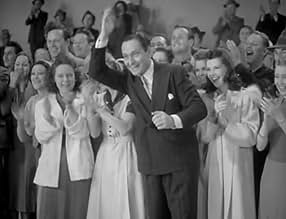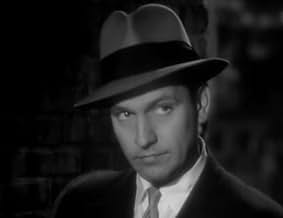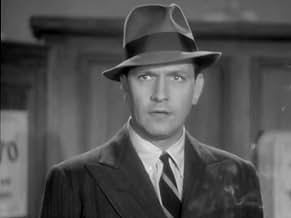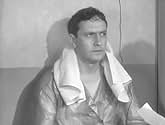A young heiress runs away from her overprotective grandfather. Penniless on the streets of New York, she manages to find employment, but a reporter knows her true identity.A young heiress runs away from her overprotective grandfather. Penniless on the streets of New York, she manages to find employment, but a reporter knows her true identity.A young heiress runs away from her overprotective grandfather. Penniless on the streets of New York, she manages to find employment, but a reporter knows her true identity.
- Director
- Writers
- Stars
- Nominated for 1 Oscar
- 1 nomination total
Syd Saylor
- Robinson
- (as Sid Saylor)
Ernie Adams
- Cafe Counterman
- (uncredited)
Ralph Brooks
- Cafe Customer
- (uncredited)
Horace G. Brown
- Ice Skater
- (uncredited)
George Burton
- Drayman
- (uncredited)
- Director
- Writers
- All cast & crew
- Production, box office & more at IMDbPro
Featured reviews
Okay, so this is a copy of It Happened One Night. Big deal. There's actually a fair amount in it that is different. The basic elements are the same: Girl runs away from dad/grandfather and dodges the detectives but comes face-to-face with a reporter hiding his identity from her.
I would say that the primary difference between films is the attitudes of the leading men. Clark is essentially blackmailing Claudette in IHON, while in this film, Fredric doesn't seem to have any intention of publicising Virginia - he doesn't want to write the story in the first place, keeps delaying the finish of his story, and finally he rips it up and refuses to do it at all. In TGMH, there is also a strange but amusing supporting actress who works in the same store as Virginia does. Oscar Shapely of IHON is not her equivalent, though amusing in his own way, believe you me.
It Happened One Night is definitely the more solid of the two movies, but There Goes My Heart is fun to watch and should be more actively viewed than it is, instead of being condemned by a majority that probably hasn't seen it, but bases their opinions on the negative reviews of others. I myself was sceptical - I just watched it prepared to react whatever way the movie led me, and I have to say that I did like it and would definitely see it again.
I would say that the primary difference between films is the attitudes of the leading men. Clark is essentially blackmailing Claudette in IHON, while in this film, Fredric doesn't seem to have any intention of publicising Virginia - he doesn't want to write the story in the first place, keeps delaying the finish of his story, and finally he rips it up and refuses to do it at all. In TGMH, there is also a strange but amusing supporting actress who works in the same store as Virginia does. Oscar Shapely of IHON is not her equivalent, though amusing in his own way, believe you me.
It Happened One Night is definitely the more solid of the two movies, but There Goes My Heart is fun to watch and should be more actively viewed than it is, instead of being condemned by a majority that probably hasn't seen it, but bases their opinions on the negative reviews of others. I myself was sceptical - I just watched it prepared to react whatever way the movie led me, and I have to say that I did like it and would definitely see it again.
I think I liked this movie despite the rather formulaic and ridiculous plot because both Viginia Bruce and Frederic March did such a wonderful job with this romantic comedy from Hal Roach Productions.
Virginia is the grand-daughter of a very wealthy but extremely overprotective man. He won't let her go anywhere without him and sees danger around every corner. As a result, she is smothered and bored--aching to live a real life. She escapes and establishes a new identity as a regular working girl. However, reporter Frederic March finds out about the ruse and wants to exploit the woman for a buck. However, once they meet, sparks begin to fly and he is torn between riches and his new love.
You know about where the movie will end--after all, it's a formulaic romantic comedy from an era when the movies never dared stray from the expected course. However, how delicately and believably the stars follow this formula is what makes this film so worth watching. A cute and satisfying little film.
By the way, at the very end there is a cute little cameo by the silent screen star Harry Langdon as the preacher. While his best years in movies were long behind him, he did continue to do small roles in a variety of films over the years.
Virginia is the grand-daughter of a very wealthy but extremely overprotective man. He won't let her go anywhere without him and sees danger around every corner. As a result, she is smothered and bored--aching to live a real life. She escapes and establishes a new identity as a regular working girl. However, reporter Frederic March finds out about the ruse and wants to exploit the woman for a buck. However, once they meet, sparks begin to fly and he is torn between riches and his new love.
You know about where the movie will end--after all, it's a formulaic romantic comedy from an era when the movies never dared stray from the expected course. However, how delicately and believably the stars follow this formula is what makes this film so worth watching. A cute and satisfying little film.
By the way, at the very end there is a cute little cameo by the silent screen star Harry Langdon as the preacher. While his best years in movies were long behind him, he did continue to do small roles in a variety of films over the years.
Broadly played and directed semi-screwball outing has charming Fredric March cast as a newspaper reporter assigned to locate a wealthy, beautiful young heiress, who has ditched her fancy surroundings for a regular life in New York City. Grounded, natural Virgina Bruce was a good choice for the rich kid, who ends up working in the department store her family owns, and Patsy Kelly is wonderfully brash as the salesgirl who unknowingly takes her in. The supporting characters are made up of wacky, genial crazies, and the actors have been encouraged to play them to the hilt, resulting in some overcooked comedy which may strike one as either funny or far too silly. There are some classic bits: the ice-skating sequence where March and Bruce end up in a game of Musical Chairs, an unbilled Marjorie Main as a plain-spoken customer in the store, and Kelly's solution to the power going out just before a fancy dinner in her apartment. The script, by Jack Jevne and Eddie Moran (from a story by Ed Sullivan!), was criticized at the time for being too close to "It Happened One Night", but it's actually far less ambitious. The plot set-up is one-half merry mix-up and the other half romantic nuttiness, and many of the lines have a punch-drunk giddiness which is very sweet. **1/2 from ****
This movie was charming. I hadn't noticed Virginia Bruce before this movie and found that she was so appealing. Bruce runs away from grand dad to experience an "ordinary" life of less privilege. She winds up befriended by Patsy Kelly who takes her under her wing finding her a job at a department store. Bruce delightfully plays the part of the runaway heiress turned salesgirl. She meets up with a reporter, Fredric March who discovers that she is the missing heiress. The rest is played out with misconceptions and misunderstandings; the stuff that romance movies thrive on. I just saw her in "Flight Angels" with one of my favorites, Dennis Morgan and I was so happy to see her. It was like seeing an old friend. I am looking forward to discovering more of her movies.
Hounded by the press, an heiress escapes from her stifling, pampered life and takes a job in her own department store.
Produced near the tail-end of the era of screwball comedies, THERE GOES MY HEART is certainly more enjoyable in its parts than in its whole. The film's plot is very silly and much too derivative of IT HAPPENED ONE NIGHT (1934). Situations seem a bit forced and the comedy does not always flow very easily.
This unease attaches itself to the lead players. Distinguished actor Fredric March, playing a strong-willed reporter, seems rather unsteady with all the fatuous behavior about him. But at least he gets to indulge in a bit of energetic acting. Unlucky Virginia Bruce, while lovely, gets to be little more than a mannequin, her comic lines few and far between.
The film's real joviality comes from its supporting actors. Loudmouthed Patsy Kelly is wonderful as the noisy shop clerk who becomes Miss Bruce's pal--watching Patsy trying to recover her missing food in a cafeteria, or attempting to sell a vibrating belt exerciser, are comic highlights. Elderly Claude Gillingwater plays Miss Bruce's grumpy millionaire grandfather. Blustery Eugene Pallette is perfect as March's apoplectic editor.
Smaller roles are also well-cast: British Alan Mowbray as Patsy's chiropractic beau; preppy Arthur Lake as March's faithful photographer; chittering Etienne Girardot as Gillingwater's diminutive factotum; and J. Farrell MacDonald as a highly suspicious cop. Robert Armstrong--his glory days as Carl Denham, Kong's captor, half a decade behind him--is completely wasted in his tiny turn as a private detective.
Movie mavens will have no difficulty in spotting two wonderful performers making unbilled appearances: no-nonsense Marjorie Main shows up as a Butterfield's customer intent on buying a fireless cooker' from Miss Bruce; and in the film's final moments look for silent screen clown Harry Langdon in a delightful cameo as a most helpful parson.
Produced near the tail-end of the era of screwball comedies, THERE GOES MY HEART is certainly more enjoyable in its parts than in its whole. The film's plot is very silly and much too derivative of IT HAPPENED ONE NIGHT (1934). Situations seem a bit forced and the comedy does not always flow very easily.
This unease attaches itself to the lead players. Distinguished actor Fredric March, playing a strong-willed reporter, seems rather unsteady with all the fatuous behavior about him. But at least he gets to indulge in a bit of energetic acting. Unlucky Virginia Bruce, while lovely, gets to be little more than a mannequin, her comic lines few and far between.
The film's real joviality comes from its supporting actors. Loudmouthed Patsy Kelly is wonderful as the noisy shop clerk who becomes Miss Bruce's pal--watching Patsy trying to recover her missing food in a cafeteria, or attempting to sell a vibrating belt exerciser, are comic highlights. Elderly Claude Gillingwater plays Miss Bruce's grumpy millionaire grandfather. Blustery Eugene Pallette is perfect as March's apoplectic editor.
Smaller roles are also well-cast: British Alan Mowbray as Patsy's chiropractic beau; preppy Arthur Lake as March's faithful photographer; chittering Etienne Girardot as Gillingwater's diminutive factotum; and J. Farrell MacDonald as a highly suspicious cop. Robert Armstrong--his glory days as Carl Denham, Kong's captor, half a decade behind him--is completely wasted in his tiny turn as a private detective.
Movie mavens will have no difficulty in spotting two wonderful performers making unbilled appearances: no-nonsense Marjorie Main shows up as a Butterfield's customer intent on buying a fireless cooker' from Miss Bruce; and in the film's final moments look for silent screen clown Harry Langdon in a delightful cameo as a most helpful parson.
Did you know
- TriviaAccording to a New York Times article on 16 October 1938, the Citizen's Chiropractic Committee of New York State sued the film producers, authors and Alan Mowbray for $100,000 claiming damages to the profession. One doctor was very upset that the film implied it was possible to go through a chiropractic school through a correspondence course. The outcome of the suit is not known.
- Quotes
Peggy O'Brien: Just think, someday i'll be Mrs. Doctor Pennypepper E. Pennypepper... then I'll find out what the E. stands for!
- Crazy creditsThe opening credits are shown as if viewed through a ship's porthole with waves erasing each set of credits.
- SoundtracksA Life on the Ocean Wave
(1838) (uncredited)
Music by Henry Russell
Lyrics by Epes Sargent
Sung a cappella by Fredric March
Details
- Runtime1 hour 23 minutes
- Color
- Aspect ratio
- 1.37 : 1
Contribute to this page
Suggest an edit or add missing content


